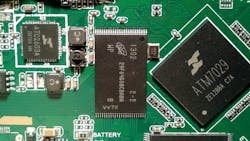Sluggish Car Sales Slow Down Chipmakers as Trade Woes Escalate
China has been a pain point for the sector as the two countries continue to spar on trade, and chipmakers had braced for slumping demand in the country to dent performance. The automotive sector has emerged as one of the biggest sources of weakness and is now threatening to dampen the chances of a recovery in the latter half of the year.
It has so far been an unfortunate year for automakers, as global sales shrank 6.5% from a year earlier in the first quarter of 2019, and 7% in the next three months, according to Bloomberg Intelligence. China led the decline with car sales in the country falling for 12 consecutive months through June, amid slowing economic growth, trade-related turmoil, and weak consumer demand, exacerbated by newer and stricter emissions rules. With the U.S. and China ratcheting the turmoil up a notch this week, some say the risks of tariffs on auto imports is now higher.
Many auto parts suppliers, as well as Ford Motor Co., have reported disappointing results and issued weak forecasts for the year, citing the China slowdown. And now the effect is rippling through the rest of the supply chain, hurting chipmakers and other industrial manufacturers.
“China weakness was expected, but in all honesty, we were expecting a trade deal by now,” Piper Jaffray & Co. analyst Harsh Kumar said in an interview. Kumar, who covers semiconductor stocks, said the companies supplying the automotive market were still seeing growth in radar and electrification-related products, while the traditional, gas engine segment is getting hit hard.
Most of the automotive chip manufacturers have a larger piece of their business associated with traditional auto, and “that is not doing so well because there isn’t any market share or penetration to be gained; it is simply a units game,” Kumar said, referring to the fewer number of cars being sold.
Maxim Integrated Products Inc., which makes chips that are used in various parts of a car including lighting, infotainment and driver assistance systems, said it expected the calendar third quarter to be slow, due to a “soft environment” for automotive production. The company’s battery management systems used in electric vehicles will also have fewer shipments, given the market uncertainty in China, the company said.
The concerns were echoed by NXP Semiconductors NV, which makes components that help a car to sense its environment and process that data. Maxim and NXP’s customers include auto suppliers such as Aptiv Plc, Lear Corp. and Visteon Corp. as well as Fiat Chrysler Automobiles NV. Other chipmakers with substantial auto market exposure include Infineon Technologies AG, Analog Devices Inc., Texas Instruments Inc., and Microchip Technology Inc.
Meanwhile, Rockwell Automation Inc., which counts both automotive and semiconductor sectors among its customers, saw both markets decline in the quarter ending June 30.
“Overall, the combination of production cuts and reductions in component inventory is having a significant impact,” Morgan Stanley’s Craig Hettenbach, who covers semiconductors, said in an email interview. The analyst said that while the weakness is most pronounced in China, Europe has also been below expectations from the beginning of the year. “There is a lot of focus on when China will provide incentives to stimulate demand, but company and investor expectations for stimulus are pretty low right now,” Hettenbach said.
A respite is not expected anytime soon. According to Moody’s, global vehicle sales are expected to fall 3.8% in 2019, amid further weakening demand in China and Western Europe. The latest round of trade war-related tariffs could make matters even worse.
By Esha Dey
About the Author
Bloomberg
Licensed content from Bloomberg, copyright 2016.
